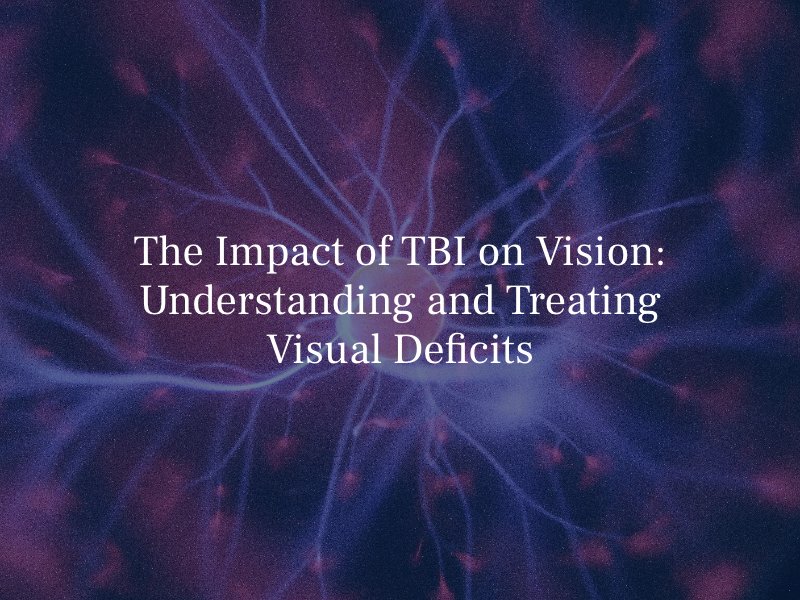The Impact of TBI on Vision: Understanding and Treating Visual Deficits
May 23, 2023 Posted In Brain Injuries
Traumatic brain injury (TBI) is a severe medical condition that can have profound effects on various aspects of a person’s life, including their vision. When the brain experiences trauma, such as a blow to the head or a penetrating injury, it can disrupt various structures and pathways involved in vision.

Why Traumatic Brain Injuries Can Impact Vision
Here are some reasons why TBIs can cause visual problems:
Direct Damage to the Visual Pathways
The visual system involves a network of structures and pathways that process and transmit visual information from the eyes to the brain. A TBI can directly damage these structures, including the optic nerves, optic tracts, or visual cortex, leading to impairments.
Shearing or Stretching of Nerve Fibers
The brain moving within the skull can cause shearing or stretching of nerve fibers, disrupting the integrity of the visual pathways, resulting in communication problems between the eyes and the brain.
Hemorrhage or Blood Vessel Damage
Severe TBIs can cause bleeding within the brain or damage to blood vessels, causing reduced blood flow or oxygen supply to the visual areas of the brain.
Swelling and Increased Pressure
The brain may swell or experience increased pressure after a TBI, which can compress and affect the visual structures. This compression can interfere with the normal functioning of the visual system, leading to visual problems.
Secondary Effects on the Visual System
TBIs can also have indirect effects on the visual system. For example, TBI-related cognitive impairments, such as attention deficits or difficulties with memory and concentration, can impact visual processing abilities and visual attention.
Types of Visual Deficits
TBI can lead to a range of vision impairments, such as:
- Visual Acuity Problems: Blurred or reduced vision, making it difficult to see objects clearly. This can affect tasks such as reading, recognizing faces, or walking.
- Visual Field Loss: A loss of peripheral or central vision. Individuals may experience blind spots, tunnel vision, or an overall reduction in their visual field. This can impact their ability to detect objects in their surroundings or affect spatial awareness.
- Oculomotor Dysfunction: TBI can disrupt the coordination of eye movements, leading to problems like double vision, difficulty tracking moving objects, or problems with focusing. These issues can interfere with tasks requiring visual tracking, such as reading or driving.
- Visual Processing Deficits: TBI can impair higher-level visual processing, including visual memory, visual attention, and visual perception. Individuals may struggle with recognizing objects, processing complex visual information, or integrating visual and cognitive tasks.
Treatment and Rehabilitation
Visual impairments from a TBI can significantly affect an individual’s quality of life, hindering their ability to perform daily activities independently. Fortunately, there are various approaches to treatment and rehabilitation, such as:
Vision Therapy
Vision therapy is a specialized treatment that involves a series of exercises and activities aimed at improving visual skills and functions. It can help address issues such as eye coordination, focusing problems, and visual processing deficits.
Multidisciplinary Rehabilitation
Collaborative rehabilitation involves a team of healthcare professionals, including occupational therapists, optometrists, and neurologists, to provide comprehensive care. They work together to address various aspects of visual deficits and develop personalized treatment plans.
Assistive Devices
Visual aids, such as magnifiers, tinted lenses, or prism glasses, can enhance visual abilities and assist with tasks like reading and driving.
Environmental Modifications
Simple changes like adequate lighting, reducing clutter, or using contrasting colors can enhance visibility and make daily tasks more manageable.
If you or a loved one have suffered a traumatic brain injury, our Riverside traumatic brain injury lawyers are available 24/7 for legal direction.